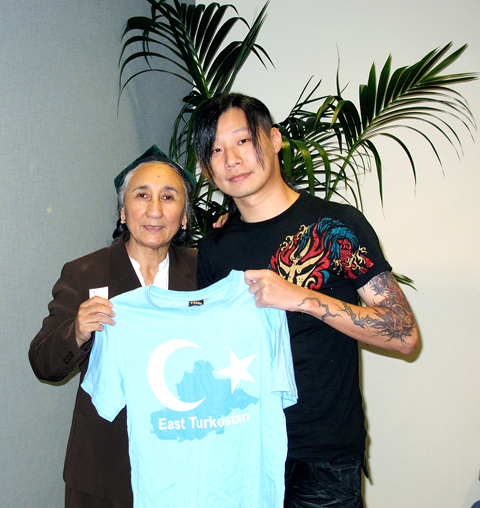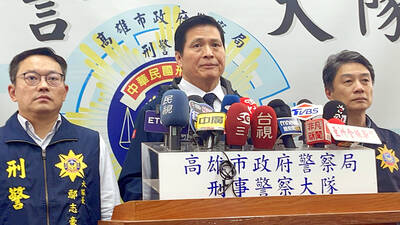Rebiya Kadeer, president of the World Uyghur Congress, said she would apply for a visa to visit Taiwan in December.
Kadeer made the remarks after meeting with Guts United Taiwan president Freddy Lim (林昶佐) at her Washington office on Wednesday and accepting his invitation to visit Taiwan.
Beijing has accused Kadeer of inciting ethnic violence and of encouraging China’s Uighur population to stage illegal protests, an allegation Kadeer denies.

PHOTO COURTESY OF THE FORMOSAN ASSOCIATION FOR PUBLIC AFFAIRS
Lim, also the front man of Taiwanese black metal band Chthonic (閃靈樂團), was in the Washington area as part of a national tour when he visited Kadeer.
“I greatly admire her. I have asked her to come to Taiwan as my guest. I am already talking with lawyers in Taiwan to get her a visa,” Lim said.
Lim said he decided to invite Kadeer after reading that the documentary about her, The 10 Conditions of Love, had become the center of “an outrageous” controversy at the Kaohsiung Film Festival.
The Kaohsiung City Government originally planned to screen the documentary at its Kaohsiung Film Festival next month, but later decided to screen it this week to end the controversy after tourism industry figures in the city complained that the festival’s plan to include the film had led to a series of hotel cancelations by Chinese tourists.
Saying the film “distorts the facts and glorifies a separatist,” Beijing had also warned Kaohsiung City against damaging cross-strait relations.
Lim said he wanted the film to be shown at colleges throughout Taiwan if Kadeer is granted a visa and visits in December.
Following her meeting with Lim, Kadeer said: “I would love to visit Taiwan, but I have not even applied for the visa yet. I want to tell Taiwanese about our struggle and about the plight of the Uighur people. I hope they will let me visit so that I can tell this human rights story.”
Lim said there is no reason why Kadeer should not be given a visa.
“She has traveled to Japan and European countries without any problems,” Lim said. “Taiwan is still part of the free world.”
In Taipei, Cabinet Spokesman Su Jun-pin (蘇俊賓) yesterday said officials would need to see Kadeer’s visa application before deciding how to handle it. The government has yet to say whether it would welcome her.
Meanwhile, a Chinese Nationalist Party (KMT) official, speaking anonymously, said the invitation was a complicated issue for the government.
The official said it would be hard for the administration of President Ma Ying-jeou (馬英九) to reject Kadeer’s application given humanitarian concerns and freedom of speech. Considering a visit by Kadeer “more sensitive” than that of Tibetan spiritual leader the Dalai Lama, who visited last month, the official expressed concern that cross-strait relations would be negatively affected if Kadeer visits.
The Democratic Progressive Pary (DPP), on the other hand, said it plans to screen more documentaries on the Tibetan and Uighur issues and to invite the directors and the individuals concern to visit Taiwan “and experience Taiwan’s democracy.”
“Just because a person is on China’s blacklist, it doesn’t mean they have to be on Taiwan’s,” DPP spokesman Chao Tien-lin (趙天麟) said.
The controversy surrounding the screening of The 10 Conditions of Love highlights that China is the real trouble maker, rudely meddling in Taiwan’s domestic affairs and interfering in freedom of speech and artistic creativity, Chao said.
ADDITIONAL REPORTING BY AFP AND STAFF WRITER

Twenty-four Republican members of the US House of Representatives yesterday introduced a concurrent resolution calling on the US government to abolish the “one China” policy and restore formal diplomatic relations with Taiwan. Led by US representatives Tom Tiffany and Scott Perry, the resolution calls for not only re-establishing formal relations, but also urges the US Trade Representative to negotiate a free-trade agreement (FTA) with Taiwan and for US officials to advocate for Taiwan’s full membership in the UN and other international organizations. In a news release announcing the resolution, Tiffany, who represents a Wisconsin district, called the “one China” policy “outdated, counterproductive

ON PAROLE: The 73-year-old suspect has a criminal record of rape committed when he was serving in the military, as well as robbery and theft, police said The Kaohsiung District Court yesterday approved the detention of a 73-year-old man for allegedly murdering three women. The suspect, surnamed Chang (張), was arrested on Wednesday evening in connection with the death of a 71-year-old woman surnamed Chao (趙). The Kaohsiung City Police Department yesterday also unveiled the identities of two other possible victims in the serial killing case, a 75-year-old woman surnamed Huang (黃), the suspect’s sister-in-law, and a 75-year-old woman surnamed Chang (張), who is not related to the suspect. The case came to light when Chao disappeared after taking the suspect back to his residence on Sunday. Police, upon reviewing CCTV

Johanne Liou (劉喬安), a Taiwanese woman who shot to unwanted fame during the Sunflower movement protests in 2014, was arrested in Boston last month amid US President Donald Trump’s crackdown on illegal immigrants, the Criminal Investigation Bureau (CIB) said yesterday. The arrest of Liou was first made public on the official Web site of US Immigration and Customs Enforcement (ICE) on Tuesday. ICE said Liou was apprehended for overstaying her visa. The Boston Field Office’s Enforcement and Removal Operations (ERO) had arrested Liou, a “fugitive, criminal alien wanted for embezzlement, fraud and drug crimes in Taiwan,” ICE said. Liou was taken into custody

TRUMP ERA: The change has sparked speculation on whether it was related to the new US president’s plan to dismiss more than 1,000 Joe Biden-era appointees The US government has declined to comment on a post that indicated the departure of Laura Rosenberger as chair of the American Institute in Taiwan (AIT). Neither the US Department of State nor the AIT has responded to the Central News Agency’s questions on the matter, after Rosenberger was listed as a former chair on the AIT’s official Web site, with her tenure marked as 2023 to this year. US officials have said previously that they usually do not comment on personnel changes within the government. Rosenberger was appointed head of the AIT in 2023, during the administration of former US president Joe